7A Unit1 This is me 复习课件
文档属性
| 名称 | 7A Unit1 This is me 复习课件 |
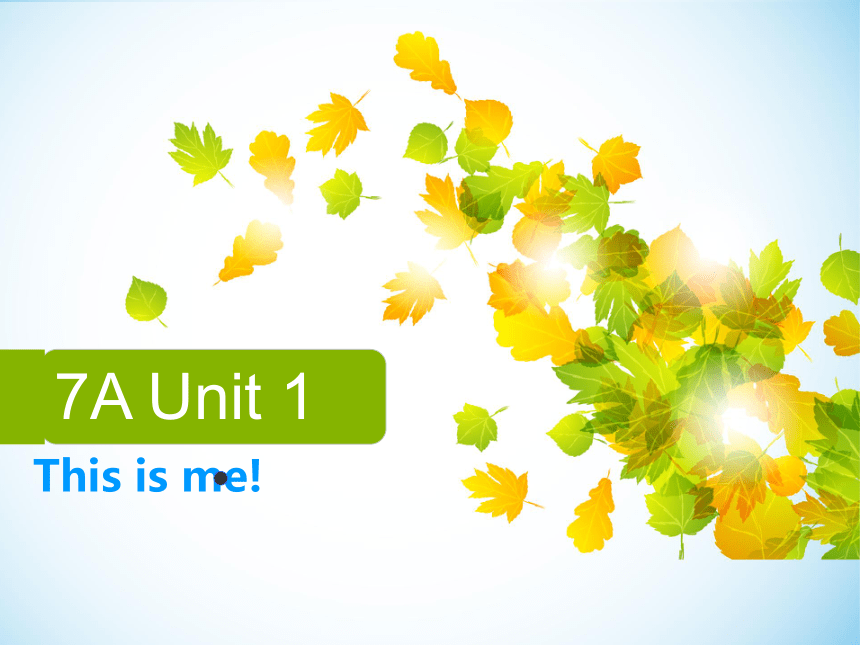
|
|
| 格式 | zip | ||
| 文件大小 | 1.2MB | ||
| 资源类型 | 教案 | ||
| 版本资源 | 牛津译林版 | ||
| 科目 | 英语 | ||
| 更新时间 | 2015-10-08 00:00:00 | ||
图片预览

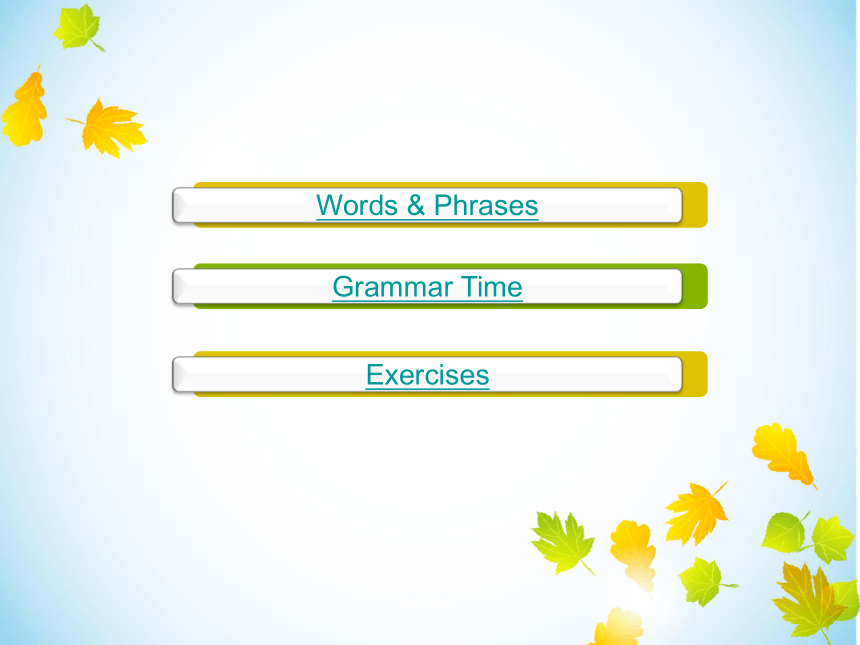

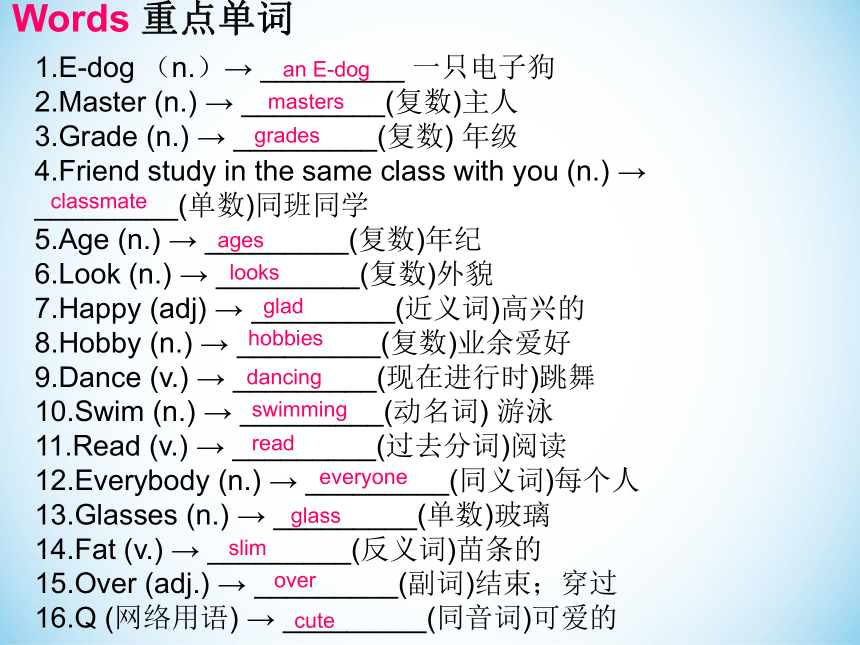
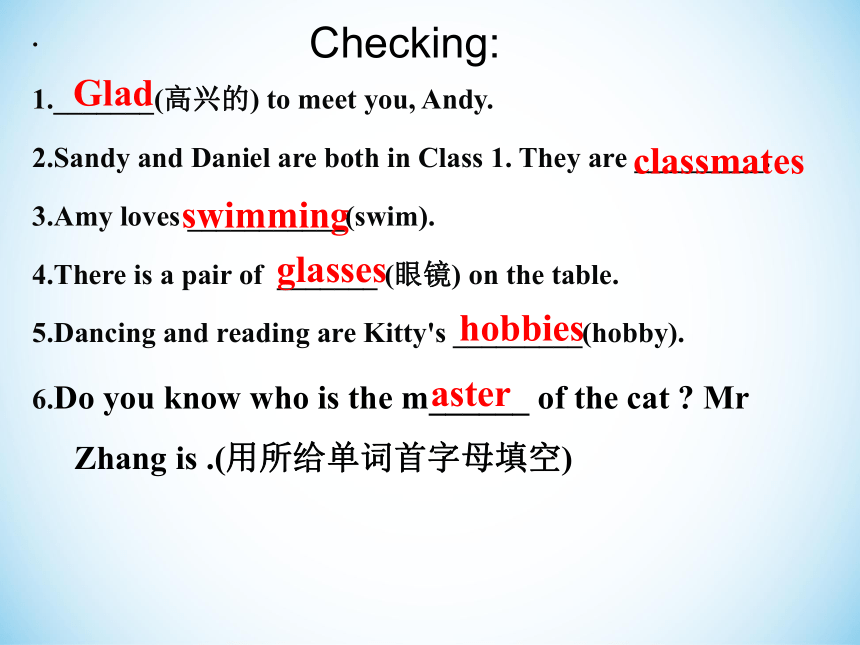
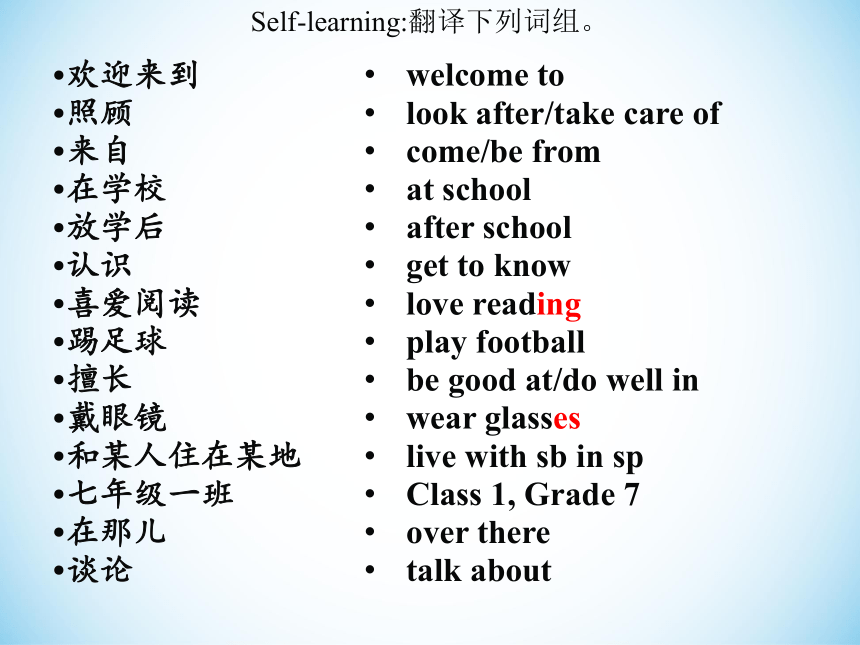
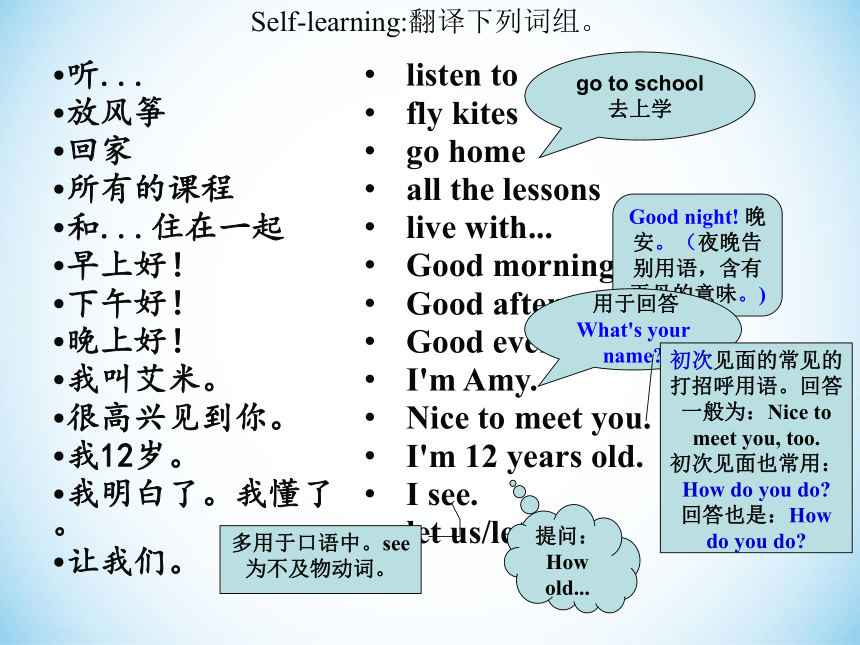
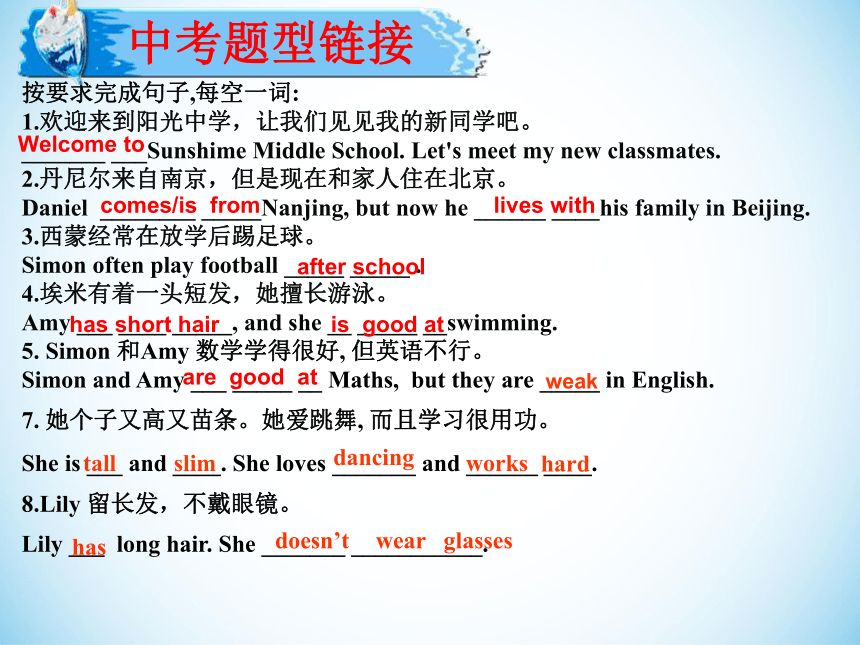
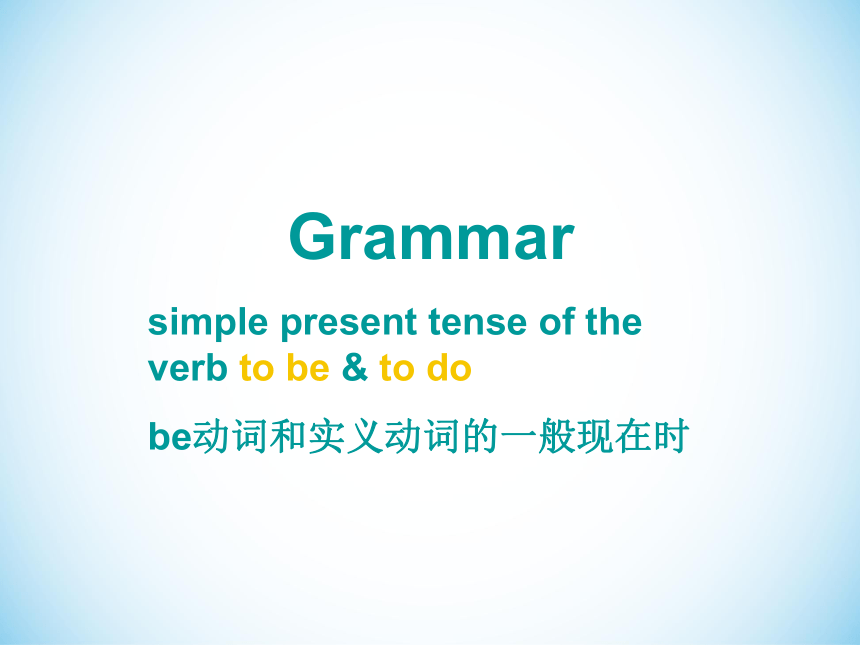
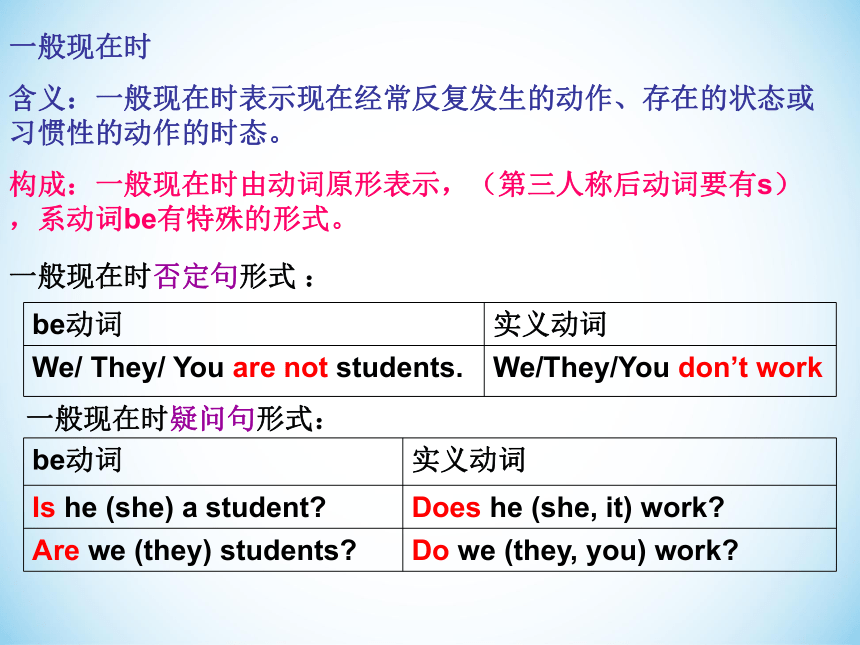
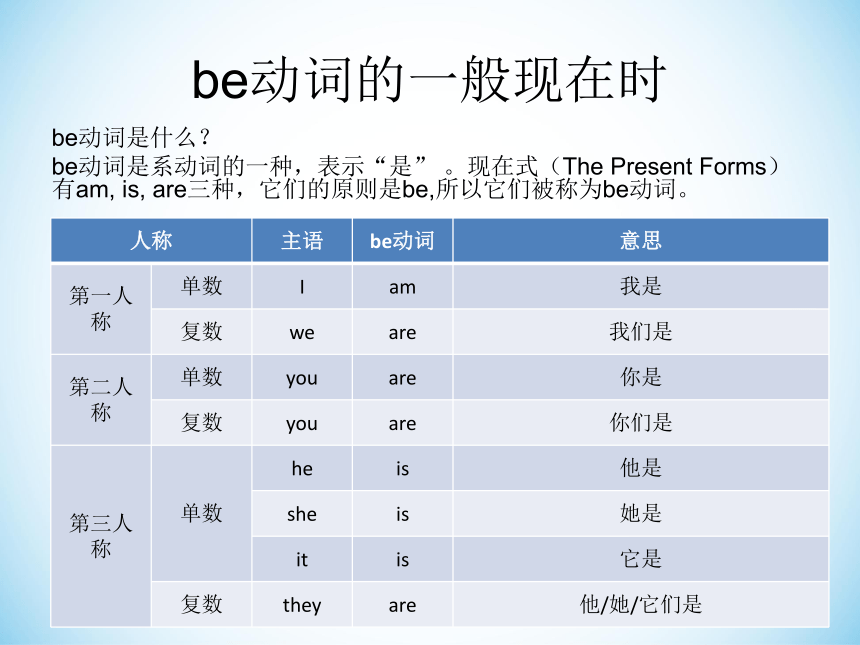
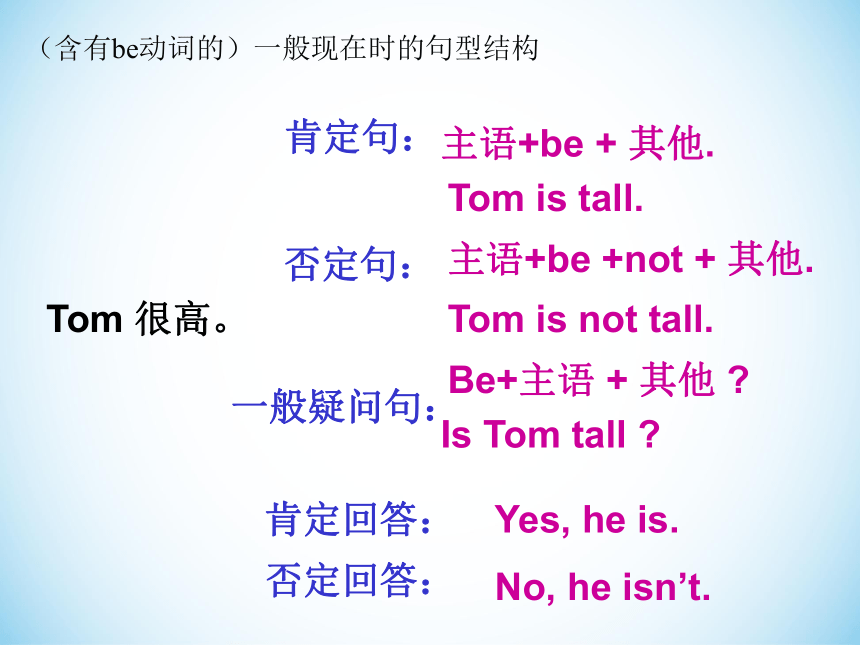
文档简介
课件39张PPT。Text ReviewWords 重点单词1.E-dog (n.)→ _________ 一只电子狗
2.Master (n.) → _________(复数)主人
3.Grade (n.) → _________(复数) 年级
4.Friend study in the same class with you (n.) → _________(单数)同班同学
5.Age (n.) → _________(复数)年纪
6.Look (n.) → _________(复数)外貌
7.Happy (adj) → _________(近义词)高兴的
8.Hobby (n.) → _________(复数)业余爱好
9.Dance (v.) → _________(现在进行时)跳舞
10.Swim (n.) → _________(动名词) 游泳
11.Read (v.) → _________(过去分词)阅读
12.Everybody (n.) → _________(同义词)每个人
13.Glasses (n.) → _________(单数)玻璃
14.Fat (v.) → _________(反义词)苗条的
15.Over (adj.) → _________(副词)结束;穿过
16.Q (网络用语) → _________(同音词)可爱的an E-dogmastersgradesclassmateageslooksgladhobbiesdancingswimmingreadeveryoneglassslimovercuteChecking:
1._______(高兴的) to meet you, Andy.
2.Sandy and Daniel are both in Class 1. They are _________.
3.Amy loves ___________(swim).
4.There is a pair of _______ (眼镜) on the table.
5.Dancing and reading are Kitty's _________(hobby).
6.Do you know who is the m______ of the cat ? Mr Zhang is .(用所给单词首字母填空)classmatesGladswimmingglasseshobbiesasterSelf-learning:翻译下列词组。欢迎来到
照顾
来自
在学校
放学后
认识
喜爱阅读
踢足球
擅长
戴眼镜
和某人住在某地
七年级一班
在那儿
谈论
welcome to
look after/take care of
come/be from
at school
after school
get to know
love reading
play football
be good at/do well in
wear glasses
live with sb in sp
Class 1, Grade 7
over there
talk about
Self-learning:翻译下列词组。听...
放风筝
回家
所有的课程
和...住在一起
早上好!
下午好!
晚上好!
我叫艾米。
很高兴见到你。
我12岁。
我明白了。我懂了。
让我们。
listen to
fly kites
go home
all the lessons
live with...
Good morning!
Good afternoon!
Good evening!
I'm Amy.
Nice to meet you.
I'm 12 years old.
I see.
let us/let's
Good night! 晚安。(夜晚告别用语,含有再见的意味。) 用于回答What's your name?初次见面的常见的打招呼用语。回答一般为:Nice to meet you, too.
初次见面也常用:How do you do? 回答也是:How do you do?多用于口语中。see 为不及物动词。提问:How old...go to school 去上学按要求完成句子,每空一词:
1.欢迎来到阳光中学,让我们见见我的新同学吧。
_______ ___Sunshime Middle School. Let's meet my new classmates.
2.丹尼尔来自南京,但是现在和家人住在北京。
Daniel ________ _____Nanjing, but now he ______ ____his family in Beijing.
3.西蒙经常在放学后踢足球。
Simon often play football _____ _____ .
4.埃米有着一头短发,她擅长游泳。
Amy ___ ____ _____, and she __ _____ __swimming.
5. Simon 和Amy 数学学得很好, 但英语不行。
Simon and Amy ___ _____ __ Maths, but they are _____ in English.
7. 她个子又高又苗条。她爱跳舞, 而且学习很用功。
She is ___ and ____. She loves _______ and ______ ____.
8.Lily 留长发,不戴眼镜。
Lily ___ long hair. She _______ ___________.
.Welcome tolives withcomes/is fromafter school has short hairis good at中考题型链接are good atweaktallslimdancingworkshardhasdoesn’t wear glassesGrammar
simple present tense of the verb to be & to do
be动词和实义动词的一般现在时一般现在时
含义:一般现在时表示现在经常反复发生的动作、存在的状态或习惯性的动作的时态。
构成:一般现在时由动词原形表示,(第三人称后动词要有s),系动词be有特殊的形式。一般现在时否定句形式?:一般现在时疑问句形式:be动词的一般现在时be动词是什么?
be动词是系动词的一种,表示“是” 。现在式(The Present Forms)有am, is, are三种,它们的原则是be,所以它们被称为be动词。(含有be动词的)一般现在时的句型结构Tom 很高。Tom is tall.主语+be + 其他.主语+be +not + 其他.Tom is not tall.Be+主语 + 其他 ?Is Tom tall ?肯定句:否定句:一般疑问句:肯定回答:Yes, he is.否定回答:No, he isn’t.Checking: 写出下列句子的否定句,一般疑问句及肯定和否定回答。
1. Jack is tall and strong .
Jack isn’t tall and strong .
Is Jack tall and strong ?
Yes , he is . / No , he isn’t .
2. My friends are in Class 4 .
My friends aren’t in Class 4 .
Are your friends in Class 4 ?
Yes , they are . / No , they aren’t.
(实义动词的)一般现在时的句型结构主语+动词原形/三单 + ......主语+don't/doesn't +动词原形+ ......Do/Does+主语 + 动词原形+...... ?肯定句:否定句:一般疑问句:肯定回答:Yes, 主语 + do/does.否定回答:No, 主语 + don't/doesn't.Simple present tense of the verb ‘ to do’一般情况下以动词原形构成。我们每天早上七点吃早饭。我经常午饭时间和我的朋友们聊天。他们每天下午照顾他们的狗。We have breakfast at 7am every day.I often chat with my friends at lunchtime.They look after their dog every afternoon.Simple present tense of the verb ‘ to do’当主语是第三人称单数时,
谓语动词要变成第三人称单数形式。她爱跳舞。这个女孩有着长发。Simon在学校学习努力。She loves dancing.The girl has long hair.Simon studies hard at school.Simple present tense of the verb ‘ to do’动词第三人称单数变化规则1.Most verbs(大部分动词)+s:walk→ take → visit → help → live → run → walkstakeshelpslivesrunsvisits2.Verbs ending in ss, ch, sh , x or o
(以ss, ch , sh ,x 或o结尾的) +es : watch→ wash →
go → do → watcheswashesdoesgoes4.Irregular verbs (不规则动词):
3.Verbs ending in a consonant +y
(以辅音字母加y 结尾的)-y+ies:Simple present tense of the verb ‘ to do’have→hasfly→ study → cry → fliesstudiescriesChecking:1.The earth ________ (go) around the sun.
2.She __________ (clean) the room once a day.
3.The man ___________ (not get) up at 7.00 every day.
4.Let’s _______ (play) games.
5.He __________ (study) English hard.
6.Who often _______ (help) you with your English?
7.Sometimes, my father _________ (fly) kites in the park.
8.Can he _________ (open) the window?
9.He should ______ (work) hard at his lessons.
10.What would you like ________ (drink)? goescleansdoesn’t getplaystudieshelpsopenworkto drinkflies11.I ______ (be) born in Nanjing.
12._____ he _____ (enjoy) _______ (play) computer games?
13.My father can ______ (speak) English and Japanese.
14. He ________ (go) to school at 7 in the morning. He _______ (have) 8 classes a day.
15.Light ________ (travel) faster than sound.
16.We _________ (not be) happy today.Checking:wasDoes enjoyplayingspeakgoeshastravelsare notMr Green likes work in China very much.
My mother often go to the shop on Sundays.
She doesn’t likes bread and cake very much.
Where does Jim and Kate work?
There are many birds on the tree.
They aren’t go to school on Saturday.Correct the mistakes: working goes like doindon’t Where do your sister study? She studies in NO.9 Middle School.
My mother works in a office far away.
Today the people in the USA usually drives to work.
Which floor do your parents live in?
Please take a bus to school. Don’t walk there on foot.doesandriveongoExploration:
Language points
知识点拓展1. Welcome to Class 1, Grade 7! 欢迎来到七年级一班!
(1)welcome感叹词,意为“欢迎”,用于对刚刚到达的人表示欢迎,welcome to...意为“欢迎来到...”,其后跟表示地点的副词时,省略to.
Welcome to China! 欢迎到中国来!
Hello, welcome home. 嗨,欢迎回家。
(2)welcome作可数名词,意为“欢迎”。give sb. a warm welcome"给某人以热烈的欢迎"
(3)welcome作形容词,意为“受欢迎的”。它可以作定语,也可以作表语。
a warm guest 一位受欢迎的客人。
You're always welcome. 随时欢迎你。
* You're welcome.可用于他人向你表示道谢时的回答,意为“不用谢,别客气。”
-Thank you very much. 非常感谢。
-You're welcome. 不用谢。
(4)Class 1, Grade 7, 意为“七年级一班”,也可写作Class One, Grade Seven.在英语中,用基数词表示编号时,应把基数词放在相应的名词之后,名词的第一个字母通常大写。
Room 405 405房间 Row 5 第5排2. often 副词,意为“经常”。often是一个表示频度的副词,通常位于助动词、连系动词be、情态动词之后,实义动词之前。
She is often late for class.
她上课经常迟到。
He can often help you.
他会经常帮助你。
We often play games in class.
我们经常在课堂上做游戏。
拓展:常见的频度副词,按频度由低到高的排列顺序为:
never(从不)→seldom(很少)→sometimes(有时)→often(经常)→usually(通常)→always(总是)
对这些表示频率的副词提问用how often.3 . like/ love/enjoy 都有“喜欢”的意思,用法稍有区别。
like和love相近,“喜欢,爱好”,用法一样.
like sth /doing sth(长期习惯) /to do sth(某次具体行为)
love sth /doing sth (长期习惯) /to do sth(某次具体行为)
* 动词加ing成为动名词,类似的单词有 dance–dancing , swim –swimming run-running , draw-drawing等。
2. enjoy 意为“喜欢”,“欣赏”,“享受…的乐趣” 不接动词不定式
enjoy sth /doing sth【特别提醒】
like 和love均能与would 连用; enjoy不用此句型。
Would you like / love to go with me? 你想和我一起去吗?
I’d like / love something to drink. 我想喝点东西。
但enjoy 可用enjoy oneself 表“玩得开心”、“过得愉快”,=have a good time / have fun;而like 和love 没有这种用法。
Did you enjoy yourself at the party last time? 上次派对你玩得开心吗?4. good 与 well ①. good (adj),副词形式用 well。 He speaks good English.
He speaks English well.
②. Well (adj) “健康的”“恰当的”或“令人满意的。
(adv) 好
I think I’m well enough to return to school. 足够健康
I learn English well. 我英语学得好
③. be good at 与 do well in 两者均可表示“擅长”. 5. let引导的祈使句祈使句:表示命令、请求、禁止或建议等语气的句子。祈使句通常省去主语you,有时为了表达委婉或客气的语气,可在句子开头或末尾加please. 其肯定结构通常以动词原形开头;否定结构在动词前加don't.Now let's meet my new classmates. (let's=let us)
现在让我们认识一下我的新同学吧。Be careful! 小心!
Don't make such noise. 不要这么吵。6. play的含义与搭配。①. 表示“打”球 (vt.&vi. ),后接球类名词,不与冠词连用
play football/ basketball/volleyball
②. 表示“演奏”乐器 (vt.)+ the;
The girl played the piano beautifully.
③. 表示“打牌;下棋” (vt.),不与冠词连用,但与game连用+the
play cards;play chess; play the game. ④. 表示“扮演”时
He played the role/ part of the king. 他扮演国王的角色。
⑤. 常用短语:
play with sth. / sb与…玩; play a trick on 捉弄; play a joke on 开玩笑;
play a part / role in 起……作用; play a CD 播放激光唱片
⑥. 作为名词时,表示“剧本、戏剧、电视剧”
put on a play 上演戏剧
①. 穿(衣服、鞋子)、戴(首饰、眼镜、手套、领带等)
wear black dress and diamond necklace 穿黑裙、戴钻石项链
wear glasses
②. 留(头发);蓄(胡须)
She wears long black hair . 她有一头黑色的长发。7. wear(wear- wore – worn)③. 面露(某种表情)
She always wears a smile on her face. 她面带微笑。
④. wear out 磨损,用坏
wear sth. out 把某物用坏 wear sb. out 使某人精疲力竭
I’ve worn out my trousers. I need to buy a new pair. 我的裤子破了,我需要再买一条新的。拓展提升in, put on, wear, dress用法辨析put on “穿上、戴上”,强调动作,后接衣服、鞋帽等。in是介词,后接表示衣服或颜色的词. wear “穿着;戴着”,表示状态,宾语可以是衣帽,也可以是饰物、奖章等。dress的宾语通常是人,意思是“给……穿衣服”。
dress sb/oneself
be dressed in 的意思是“穿着”,表示状态。(= wear/ be wearing)
dress up的意思是“盛装打扮、乔装打扮”。8. Excuse me.与 I’m sorry.Excuse me. 请原谅(在说或做可能令人不悦的事情之前使用);或解释为“请问,打扰一下”(在要打扰别人或要打断别人谈话或要吸引别人注意时使用)
I’m sorry. 抱歉,对不起。(求别人原谅自己错误时所说,表达歉意)1. Oh, _______________, I lost your book on my way home.
2. _______________, could you tell me the way to the park?
3. --- May I swim here? --- ____________, you can’t.
4. ________________, may I smoke here?练习:选择Excuse me或I’m sorry填空I’m sorryExcuse meI’m sorryExcuse me单项选择题:
1.(单选,2015广西贺州)
Linda, I have to go shopping now. Please ____ your little sister at home.
A. look for B. look like C. look after D.look up
2. (单选,2015广东)
The assistant won't let you ____ the cinema if you don't have a ticket.
A. enter B.to enter C.enteringCA1. She likes_________ (swim) in summer.
2. Tom’s mother_______ (enjoy) ________ (dance).
3. At the weekend, Tony usually_____ (go)_______ (run) in the park.
4. You can _____ (call) ______ (his) John.用所给词的适当形式填空:swimmingenjoys dancinggoesrunningcallhim5. The question is too difficult. I _______________ (not understand) it.
6. -_____(be) you a member of the
Reading Club?
-Yes, I ___(be). I ____(like) reading.
7. I want ___ (go) with you.
8. He often ______(have) dinner at home with his grandparents.don’t understandAreamliketo gohas9. She looks _____ (happily) today.
10. He ___________(not,do) his homework every evening. Sometimes he ________ (watch) TV.
11. -___ (be) he from Shanghai?
- No, he ____ (not be). He ___(be)
from Nanjing.
12.-Where ____(be) you from?
- We ___(be) from America.happydoesn’t dowatchesIs isn’tisareare1. Would you like to be a teacher?
___ you _____ to be a teacher?
2. Tom plays volleyball very well.
Tom _________volleyball.
3. My father buys me a pencil.
My father ____ a pencil ___ me.
4. He often goes home on foot.
He often ______ home.wantis good at Do walks buysfor写出下列句子的同义句, 每格一词:根据表格中所给内容写一份自我介绍。写作训练营Example 优秀范文Hello, I'm Zhang Wei. I'm 13. I am a student of Nanjing Yucai Secondary School. I'm in Class 1, Grade 7. I like playing football and reading. I am good at computer and English. I live at No.32 on Zhongshan Road with my parents. My father is a teacher and he likes watching football matches. My mother is a doctor. They love me very much.写作技巧:
1. 描述对象的姓名和关系,然后,根据所给内容进行描述。
2. 时态用一般现在时。Thank you for your time!
2.Master (n.) → _________(复数)主人
3.Grade (n.) → _________(复数) 年级
4.Friend study in the same class with you (n.) → _________(单数)同班同学
5.Age (n.) → _________(复数)年纪
6.Look (n.) → _________(复数)外貌
7.Happy (adj) → _________(近义词)高兴的
8.Hobby (n.) → _________(复数)业余爱好
9.Dance (v.) → _________(现在进行时)跳舞
10.Swim (n.) → _________(动名词) 游泳
11.Read (v.) → _________(过去分词)阅读
12.Everybody (n.) → _________(同义词)每个人
13.Glasses (n.) → _________(单数)玻璃
14.Fat (v.) → _________(反义词)苗条的
15.Over (adj.) → _________(副词)结束;穿过
16.Q (网络用语) → _________(同音词)可爱的an E-dogmastersgradesclassmateageslooksgladhobbiesdancingswimmingreadeveryoneglassslimovercuteChecking:
1._______(高兴的) to meet you, Andy.
2.Sandy and Daniel are both in Class 1. They are _________.
3.Amy loves ___________(swim).
4.There is a pair of _______ (眼镜) on the table.
5.Dancing and reading are Kitty's _________(hobby).
6.Do you know who is the m______ of the cat ? Mr Zhang is .(用所给单词首字母填空)classmatesGladswimmingglasseshobbiesasterSelf-learning:翻译下列词组。欢迎来到
照顾
来自
在学校
放学后
认识
喜爱阅读
踢足球
擅长
戴眼镜
和某人住在某地
七年级一班
在那儿
谈论
welcome to
look after/take care of
come/be from
at school
after school
get to know
love reading
play football
be good at/do well in
wear glasses
live with sb in sp
Class 1, Grade 7
over there
talk about
Self-learning:翻译下列词组。听...
放风筝
回家
所有的课程
和...住在一起
早上好!
下午好!
晚上好!
我叫艾米。
很高兴见到你。
我12岁。
我明白了。我懂了。
让我们。
listen to
fly kites
go home
all the lessons
live with...
Good morning!
Good afternoon!
Good evening!
I'm Amy.
Nice to meet you.
I'm 12 years old.
I see.
let us/let's
Good night! 晚安。(夜晚告别用语,含有再见的意味。) 用于回答What's your name?初次见面的常见的打招呼用语。回答一般为:Nice to meet you, too.
初次见面也常用:How do you do? 回答也是:How do you do?多用于口语中。see 为不及物动词。提问:How old...go to school 去上学按要求完成句子,每空一词:
1.欢迎来到阳光中学,让我们见见我的新同学吧。
_______ ___Sunshime Middle School. Let's meet my new classmates.
2.丹尼尔来自南京,但是现在和家人住在北京。
Daniel ________ _____Nanjing, but now he ______ ____his family in Beijing.
3.西蒙经常在放学后踢足球。
Simon often play football _____ _____ .
4.埃米有着一头短发,她擅长游泳。
Amy ___ ____ _____, and she __ _____ __swimming.
5. Simon 和Amy 数学学得很好, 但英语不行。
Simon and Amy ___ _____ __ Maths, but they are _____ in English.
7. 她个子又高又苗条。她爱跳舞, 而且学习很用功。
She is ___ and ____. She loves _______ and ______ ____.
8.Lily 留长发,不戴眼镜。
Lily ___ long hair. She _______ ___________.
.Welcome tolives withcomes/is fromafter school has short hairis good at中考题型链接are good atweaktallslimdancingworkshardhasdoesn’t wear glassesGrammar
simple present tense of the verb to be & to do
be动词和实义动词的一般现在时一般现在时
含义:一般现在时表示现在经常反复发生的动作、存在的状态或习惯性的动作的时态。
构成:一般现在时由动词原形表示,(第三人称后动词要有s),系动词be有特殊的形式。一般现在时否定句形式?:一般现在时疑问句形式:be动词的一般现在时be动词是什么?
be动词是系动词的一种,表示“是” 。现在式(The Present Forms)有am, is, are三种,它们的原则是be,所以它们被称为be动词。(含有be动词的)一般现在时的句型结构Tom 很高。Tom is tall.主语+be + 其他.主语+be +not + 其他.Tom is not tall.Be+主语 + 其他 ?Is Tom tall ?肯定句:否定句:一般疑问句:肯定回答:Yes, he is.否定回答:No, he isn’t.Checking: 写出下列句子的否定句,一般疑问句及肯定和否定回答。
1. Jack is tall and strong .
Jack isn’t tall and strong .
Is Jack tall and strong ?
Yes , he is . / No , he isn’t .
2. My friends are in Class 4 .
My friends aren’t in Class 4 .
Are your friends in Class 4 ?
Yes , they are . / No , they aren’t.
(实义动词的)一般现在时的句型结构主语+动词原形/三单 + ......主语+don't/doesn't +动词原形+ ......Do/Does+主语 + 动词原形+...... ?肯定句:否定句:一般疑问句:肯定回答:Yes, 主语 + do/does.否定回答:No, 主语 + don't/doesn't.Simple present tense of the verb ‘ to do’一般情况下以动词原形构成。我们每天早上七点吃早饭。我经常午饭时间和我的朋友们聊天。他们每天下午照顾他们的狗。We have breakfast at 7am every day.I often chat with my friends at lunchtime.They look after their dog every afternoon.Simple present tense of the verb ‘ to do’当主语是第三人称单数时,
谓语动词要变成第三人称单数形式。她爱跳舞。这个女孩有着长发。Simon在学校学习努力。She loves dancing.The girl has long hair.Simon studies hard at school.Simple present tense of the verb ‘ to do’动词第三人称单数变化规则1.Most verbs(大部分动词)+s:walk→ take → visit → help → live → run → walkstakeshelpslivesrunsvisits2.Verbs ending in ss, ch, sh , x or o
(以ss, ch , sh ,x 或o结尾的) +es : watch→ wash →
go → do → watcheswashesdoesgoes4.Irregular verbs (不规则动词):
3.Verbs ending in a consonant +y
(以辅音字母加y 结尾的)-y+ies:Simple present tense of the verb ‘ to do’have→hasfly→ study → cry → fliesstudiescriesChecking:1.The earth ________ (go) around the sun.
2.She __________ (clean) the room once a day.
3.The man ___________ (not get) up at 7.00 every day.
4.Let’s _______ (play) games.
5.He __________ (study) English hard.
6.Who often _______ (help) you with your English?
7.Sometimes, my father _________ (fly) kites in the park.
8.Can he _________ (open) the window?
9.He should ______ (work) hard at his lessons.
10.What would you like ________ (drink)? goescleansdoesn’t getplaystudieshelpsopenworkto drinkflies11.I ______ (be) born in Nanjing.
12._____ he _____ (enjoy) _______ (play) computer games?
13.My father can ______ (speak) English and Japanese.
14. He ________ (go) to school at 7 in the morning. He _______ (have) 8 classes a day.
15.Light ________ (travel) faster than sound.
16.We _________ (not be) happy today.Checking:wasDoes enjoyplayingspeakgoeshastravelsare notMr Green likes work in China very much.
My mother often go to the shop on Sundays.
She doesn’t likes bread and cake very much.
Where does Jim and Kate work?
There are many birds on the tree.
They aren’t go to school on Saturday.Correct the mistakes: working goes like doindon’t Where do your sister study? She studies in NO.9 Middle School.
My mother works in a office far away.
Today the people in the USA usually drives to work.
Which floor do your parents live in?
Please take a bus to school. Don’t walk there on foot.doesandriveongoExploration:
Language points
知识点拓展1. Welcome to Class 1, Grade 7! 欢迎来到七年级一班!
(1)welcome感叹词,意为“欢迎”,用于对刚刚到达的人表示欢迎,welcome to...意为“欢迎来到...”,其后跟表示地点的副词时,省略to.
Welcome to China! 欢迎到中国来!
Hello, welcome home. 嗨,欢迎回家。
(2)welcome作可数名词,意为“欢迎”。give sb. a warm welcome"给某人以热烈的欢迎"
(3)welcome作形容词,意为“受欢迎的”。它可以作定语,也可以作表语。
a warm guest 一位受欢迎的客人。
You're always welcome. 随时欢迎你。
* You're welcome.可用于他人向你表示道谢时的回答,意为“不用谢,别客气。”
-Thank you very much. 非常感谢。
-You're welcome. 不用谢。
(4)Class 1, Grade 7, 意为“七年级一班”,也可写作Class One, Grade Seven.在英语中,用基数词表示编号时,应把基数词放在相应的名词之后,名词的第一个字母通常大写。
Room 405 405房间 Row 5 第5排2. often 副词,意为“经常”。often是一个表示频度的副词,通常位于助动词、连系动词be、情态动词之后,实义动词之前。
She is often late for class.
她上课经常迟到。
He can often help you.
他会经常帮助你。
We often play games in class.
我们经常在课堂上做游戏。
拓展:常见的频度副词,按频度由低到高的排列顺序为:
never(从不)→seldom(很少)→sometimes(有时)→often(经常)→usually(通常)→always(总是)
对这些表示频率的副词提问用how often.3 . like/ love/enjoy 都有“喜欢”的意思,用法稍有区别。
like和love相近,“喜欢,爱好”,用法一样.
like sth /doing sth(长期习惯) /to do sth(某次具体行为)
love sth /doing sth (长期习惯) /to do sth(某次具体行为)
* 动词加ing成为动名词,类似的单词有 dance–dancing , swim –swimming run-running , draw-drawing等。
2. enjoy 意为“喜欢”,“欣赏”,“享受…的乐趣” 不接动词不定式
enjoy sth /doing sth【特别提醒】
like 和love均能与would 连用; enjoy不用此句型。
Would you like / love to go with me? 你想和我一起去吗?
I’d like / love something to drink. 我想喝点东西。
但enjoy 可用enjoy oneself 表“玩得开心”、“过得愉快”,=have a good time / have fun;而like 和love 没有这种用法。
Did you enjoy yourself at the party last time? 上次派对你玩得开心吗?4. good 与 well ①. good (adj),副词形式用 well。 He speaks good English.
He speaks English well.
②. Well (adj) “健康的”“恰当的”或“令人满意的。
(adv) 好
I think I’m well enough to return to school. 足够健康
I learn English well. 我英语学得好
③. be good at 与 do well in 两者均可表示“擅长”. 5. let引导的祈使句祈使句:表示命令、请求、禁止或建议等语气的句子。祈使句通常省去主语you,有时为了表达委婉或客气的语气,可在句子开头或末尾加please. 其肯定结构通常以动词原形开头;否定结构在动词前加don't.Now let's meet my new classmates. (let's=let us)
现在让我们认识一下我的新同学吧。Be careful! 小心!
Don't make such noise. 不要这么吵。6. play的含义与搭配。①. 表示“打”球 (vt.&vi. ),后接球类名词,不与冠词连用
play football/ basketball/volleyball
②. 表示“演奏”乐器 (vt.)+ the;
The girl played the piano beautifully.
③. 表示“打牌;下棋” (vt.),不与冠词连用,但与game连用+the
play cards;play chess; play the game. ④. 表示“扮演”时
He played the role/ part of the king. 他扮演国王的角色。
⑤. 常用短语:
play with sth. / sb与…玩; play a trick on 捉弄; play a joke on 开玩笑;
play a part / role in 起……作用; play a CD 播放激光唱片
⑥. 作为名词时,表示“剧本、戏剧、电视剧”
put on a play 上演戏剧
①. 穿(衣服、鞋子)、戴(首饰、眼镜、手套、领带等)
wear black dress and diamond necklace 穿黑裙、戴钻石项链
wear glasses
②. 留(头发);蓄(胡须)
She wears long black hair . 她有一头黑色的长发。7. wear(wear- wore – worn)③. 面露(某种表情)
She always wears a smile on her face. 她面带微笑。
④. wear out 磨损,用坏
wear sth. out 把某物用坏 wear sb. out 使某人精疲力竭
I’ve worn out my trousers. I need to buy a new pair. 我的裤子破了,我需要再买一条新的。拓展提升in, put on, wear, dress用法辨析put on “穿上、戴上”,强调动作,后接衣服、鞋帽等。in是介词,后接表示衣服或颜色的词. wear “穿着;戴着”,表示状态,宾语可以是衣帽,也可以是饰物、奖章等。dress的宾语通常是人,意思是“给……穿衣服”。
dress sb/oneself
be dressed in 的意思是“穿着”,表示状态。(= wear/ be wearing)
dress up的意思是“盛装打扮、乔装打扮”。8. Excuse me.与 I’m sorry.Excuse me. 请原谅(在说或做可能令人不悦的事情之前使用);或解释为“请问,打扰一下”(在要打扰别人或要打断别人谈话或要吸引别人注意时使用)
I’m sorry. 抱歉,对不起。(求别人原谅自己错误时所说,表达歉意)1. Oh, _______________, I lost your book on my way home.
2. _______________, could you tell me the way to the park?
3. --- May I swim here? --- ____________, you can’t.
4. ________________, may I smoke here?练习:选择Excuse me或I’m sorry填空I’m sorryExcuse meI’m sorryExcuse me单项选择题:
1.(单选,2015广西贺州)
Linda, I have to go shopping now. Please ____ your little sister at home.
A. look for B. look like C. look after D.look up
2. (单选,2015广东)
The assistant won't let you ____ the cinema if you don't have a ticket.
A. enter B.to enter C.enteringCA1. She likes_________ (swim) in summer.
2. Tom’s mother_______ (enjoy) ________ (dance).
3. At the weekend, Tony usually_____ (go)_______ (run) in the park.
4. You can _____ (call) ______ (his) John.用所给词的适当形式填空:swimmingenjoys dancinggoesrunningcallhim5. The question is too difficult. I _______________ (not understand) it.
6. -_____(be) you a member of the
Reading Club?
-Yes, I ___(be). I ____(like) reading.
7. I want ___ (go) with you.
8. He often ______(have) dinner at home with his grandparents.don’t understandAreamliketo gohas9. She looks _____ (happily) today.
10. He ___________(not,do) his homework every evening. Sometimes he ________ (watch) TV.
11. -___ (be) he from Shanghai?
- No, he ____ (not be). He ___(be)
from Nanjing.
12.-Where ____(be) you from?
- We ___(be) from America.happydoesn’t dowatchesIs isn’tisareare1. Would you like to be a teacher?
___ you _____ to be a teacher?
2. Tom plays volleyball very well.
Tom _________volleyball.
3. My father buys me a pencil.
My father ____ a pencil ___ me.
4. He often goes home on foot.
He often ______ home.wantis good at Do walks buysfor写出下列句子的同义句, 每格一词:根据表格中所给内容写一份自我介绍。写作训练营Example 优秀范文Hello, I'm Zhang Wei. I'm 13. I am a student of Nanjing Yucai Secondary School. I'm in Class 1, Grade 7. I like playing football and reading. I am good at computer and English. I live at No.32 on Zhongshan Road with my parents. My father is a teacher and he likes watching football matches. My mother is a doctor. They love me very much.写作技巧:
1. 描述对象的姓名和关系,然后,根据所给内容进行描述。
2. 时态用一般现在时。Thank you for your time!
同课章节目录
- 预备课程
- Lesson 1 Nice to meet you !
- Lesson 2 A happy family
- Lesson 3 A nice school
- Lesson 4 You look cool !
- Lesson 5 Wonderful things
- Lesson 6 Have nice food
- Lesson 7 Enjoy our days
- Lesson 8 Let's have fun !
- Unit 1 This is me
- Unit 2 Let's play sports
- Unit 3 Welcome to our school
- Unit 4 My day
- Unit 5 Let’s celebrate
- Unit 6 Food and lifestyle
- Unit 7 Shopping
- Unit 8 Fashion
